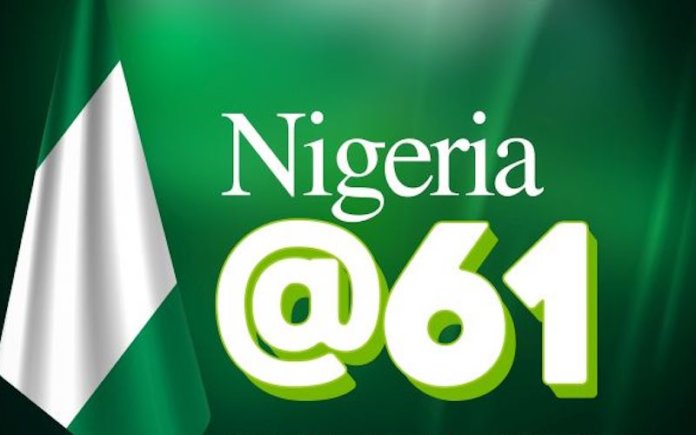Written by David Ugbabe
As a country, we have faced various struggles, and have surmounted most of them. Our diversity and adversities have taught us to not only fight together, but to adapt with all that life has presented to us. As Nigeria celebrates its 61st anniversary, there is so much that is worth celebrating. What exactly are we celebrating?
In terms of leadership, we understand that leading the country is not easy but the Buhari-led administration has in its capacity been able to make some accomplishments which include; completion of 327km Itakpe-Warri Standard Gauge Rail after 33 years, completion of New Terminals for International Airports in Lagos, Abuja, Kano and Port Harcourt, nationwide rollout of electricity meters to all on-grid consumers, launched in August 2020, successful completion of Nigeria’s first Marginal Field Bid Round in almost 20 years, expected to raise in excess of half a billion dollars, and open up a new vista of investment in oil and gas, as well as other accomplishments.
WHERE ARE WE AFTER 61 YEARS OF INDEPENDENCE
We are not where we want to be but we are not where we used to be. The founding fathers of this great nation had a purpose for which they were fighting. An agro-powered economy was seeing a huge growth rate through exportation of groundnut, palm oil, and cocoa and this was noted by President Muhammadu Buhari during his independence speech last year when he said, “Our founding fathers understood the imperative of structuring a national identity using the power of the state and worked towards the unification of Nigerians in a politically stable and viable entity. That philosophy guided the foundation that was laid for our young nation of 45 million people.”
Despite all this, 61 years down the line many opinion leaders, groups and communities lament that our reality is the very contrast of what our founding fathers had in mind and all they fought for. There are many questions that remain unanswered.
WHERE IS THE BUHARI’S FOCUS?
The desire of the people is mainly to enjoy the dividends of democracy and expect that their votes would count for something. Many Nigerians such as Nnamdi Kanu, Omoyele Sowore and Sunday Igboho have bitter tales to tell, therefore there is this concern that the administration is rather focused on power than the job it is called to do. Nigeria’s foremost professor, Pat Utomi, noted that President Muhammadu Buhari-led administration is currently focused on power rather than on purpose. He argued that this misguided focus and “obsession with power will just make us poorer, more miserable, create more insecurity and I think this is the real starting point purpose and not power.’’
THE YOUTH AND THE NATION
In the last year, Nigerian youths have had a very traumatic experience that has dealt a heavy blow to them. The #EndSARS protest which saw youths come out en masse to bemoan the societal ills of police brutality, indiscriminate arrests, and the excesses of rogue police officers and operatives of different police units finally broke the camel’s back exposing the disinterest of this administration following due processes in addressing important national issues and would compromise even if they don’t have to. While many seem to have moved on, the families of victims of the massacre have not healed and are yet to see justice served.
ALSO READ: Nigeria, A Plane on Suicide Slide Says Wole Soyinka
ARE WE UNITED?
Living life in the beautiful city of Jos in the 70s up until the 90s was great, visiting one of the oldest Golf courses in Nigeria. People of different tribes across the country would turn up for events such as the Argungu festival feeling much accepted. What we see today is a complete contrast of what Nigeria used to be. The silence on banditry, open grazing and heavy criticism of the agitations of the IPOB have painted this administration as a one-sided government.
Editor and present on Arise TV, Reuben Abati had an interview with President Muhammadu Buhari on June after which he noted that, “Nigeria is more divided today than at any other time in our history. And certainly, the President’s responses reinforce this conclusion because his main constituencies and supporters see nothing fundamentally wrong with his media statements in the last few days.”
STATE OF THE ECONOMY
The fall in oil prices has had an adverse effect on Nigeria’s economy. Former CBN Governor and Emir, Alhaji Muhammad Sanusi, lamented that aside from the fact that Nigeria is having difficulties in oil production, the product is now being rejected in the global market. He warned that the “goose laying the golden egg for Nigeria is about to die”. Yet the government continues to borrow; if this continues, we run the risk of a worsening economic situation and getting into another round of debt traps.
In conclusion, while we believe that one day, Nigeria will live up to its name as the giant of Africa, we are aware that one of Nigeria’s major problems is poor leadership, illiteracy and mismanagement of resources. Nigeria should take clues from nations such as Mali and Afghanistan whose leadership has failed, leading to problems that have forever changed things for their citizens. According to Prof Utomi, “Leaders should provide leadership; democracy needs to be sensitive to the people. The unfortunate situation with the current reality is that the political class, especially the executive, is totally insensitive to the Nigerian people, almost offensively intolerant of what Nigerians think.”


